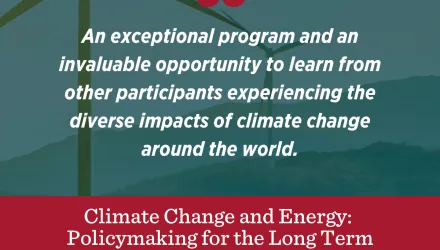Energy's Secrets: Finding the Balance
By Jennifer Weeks & John P. Holdren
A year after the Chinese nuclear espionage flap began, the impact of security reforms at the Energy Department is clear. Despite calls for maintaining a rational balance between openness and secrecy, policy responses have leaned heavily toward tighter restrictions on access to information and greater constraints on international scientific cooperation. Policy-makers rushing to "fix" alleged nuclear leaks have all but forgotten the benefits of openness, which relate not only to the conduct of science and the exercise of democracy but also to national security itself.
From 1993 through mid-1998, the department's approach to managing nuclear information emphasized reducing unnecessary secrecy and determining which categories of weapons-related information most required continued protection. Under the Openness Initiative of Hazel O'Leary, who was then secretary of energy, thousands of documents on nuclear weapons issues were declassified. O'Leary further committed the department to a broad overhaul of its classification policy aimed at building "higher fences" around narrower classes of information‹information that really ought to be kept secret.
The department also worked with Russia, China, and other countries to protect weapon-usable materials, verify arms control treaties, and improve export controls. These programs involved a degree of interaction that would have been unthinkable a decade ago, but which has demonstrably enhanced U.S. national security.
But the openness trend has been reversed. In response to possible leaks or theft of weapons-related information, Congress and the administration have intensified controls over nuclear information through measures ranging from a freeze on automatic declassification to increased use of lie detectors and restrictions on international cooperation at Energy Department laboratories. These actions threaten U.S. security more than they enhance it.
Alarm bells
From the beginning, O'Leary's openness efforts alarmed many in the national security community. They feared that declassification and increased access to information might contribute to nuclear proliferation or benefit potential U.S. adversaries. The critics gained ammunition in 1998 when nuclear weapons design information was found in some documents more than 25 years old, which had been slated for automatic declassification within several years under a 1995 executive order.
Congress immediately barred the department from automatically declassifying documents without reviewing them, and it directed the department to develop a plan for screening documents that might contain nuclear weapons-related information. At Energy Secretary Bill Richardson's request, President Bill Clinton extended the deadline for automatically declassifying documents under the 1995 order by up to 36 months.
The 1998 "Chinese spy scandal" added fuel to the fire. The report of a special House committee chaired by Christopher Cox, a Republican from California, released on May 25, 1999, took a worst-case view. China, it said, had stolen and would exploit information on advanced U.S. thermonuclear weapons.
Reports of possible Chinese espionage at the weapons labs triggered calls for sweeping action. Further, they reinforced concerns about the Energy Department's openness measures among those who had long believed that the agency's let-the-sun-shine-in policy was symptomatic of a casual attitude toward protecting critical nuclear-weapons information.
Worries about lax security were not entirely unjustified. Congressional and executive branch reports had for years documented security lapses at the department and the failure by the department to fix problems once identified. A 1997 report from the General Accounting Office, for instance, said:
•Energy was performing background checks on only about five percent of visitors from sensitive countries to the Los Alamos and Sandia laboratories.
• The weapons labs did not always review the subject matter of these visits with the Energy Department in advance.
•Some foreign visitors had obtained access to sensitive and classified information.The General Accounting Office might well have added that the labs were complacent about computer security, while they were becoming ever more computer-dependent.
Energy Secretary Richardson announced a series of security reforms throughout 1999. In addition to delaying automatic document declassification, Richardson:
•Consolidated a number of Energy Department offices into a new Office of Security and Emergency Operations, run by Gen. Eugene Habiger, a former head of Strategic Command. The new office assumed responsibility for safeguards, security, cyber-security, classification and declassification, and for keeping track of uranium and plutonium.
•Increased the department's cyber-security budget and initiated random computer audits.
•Strengthened the department's counterintelligence program through steps such as Red Team inspections and stronger controls over contacts with foreigners from sensitive countries.
•Tightened security for unclassified foreign visits and assignments at department facilities.
•Conducted security stand-downs throughout the department's complex and organized independent security reviews of the weapons labs.
•Expanded the use of polygraphs for employees with access to sensitive nuclear information.
Many of these actions sought to preempt even more stringent legislative requirements. Some members of Congress, for example, called for a moratorium of up to two years on all foreign visits to Energy Department labs. (Congress ultimately imposed a narrower moratorium on visits from sensitive countries.)
After first proposing a major expansion of polygraphs, the department's new lie detector plan was scaled back to a moderate alternative that would cover about 800 people, some of whom werealready subject to such tests.
The Energy Department also tried and failed to head off congressional pressure to restructure the department to create an autonomous internal agency in charge of all military nuclear activities. The new National Nuclear Security Administration was created because of a recommendation by a special panel of the President's Foreign Intelligence Advisory Board, chaired by former Senator Warren Rudman.
The Rudman commission's scathing report on security lapses at the weapons labs cited "organizational disarray, managerial neglect, and a culture of arrogance" as the root of the Energy Department's problems. It argued that making the department's defense facilities more accountable required stripping away redundant layers of agency oversight.
The head of the new National Nuclear Security Administration, who has not yet been chosen will report directly to the secretary of energy.
John Spratt, a Democrat from South Carolina who served on the Cox committee and who has since criticized many of the panel's highly charged findings, noted when the law was passed that both the Energy Department and the new agency would have counterintelligence offices. Further, he said, the legislation did not define how they should interact or where their responsibilities would divide.
Will this reform create more confusion rather than increasing security? We will eventually find out.
How much is enough?
These measures and the search for scapegoats in the espionage investigation have frozen progress toward increased openness and access to information on nuclear policy issues, even in areas where there is no policy justification for clamping down and where continued openness is in the national interest. In fact, there is a real risk that "reforms" will produce a net decrease in U.S. nuclear security.
While the Cox report drove much of the debate over protecting nuclear secrets, broad disagreement remains over whether China actually stole U.S. nuclear weapons information and, if it did, whether Beijing can or will use such information to enhance its military capabilities.
Other analyses last year took a more measured approach and offered more balanced recommendations. For example, a panel of security experts headed by Adm. David Jeremiah called for a "net assessment" of U.S. contacts with Chinese and Russian nuclear weapons specialists, noting, "The value of these contacts to the United States . . . should not be lost in our concern about protecting secrets."
Last October, a special committee of the National Academy of Sciences, the National Academy of Engineering, and the Institute of Medicine issued a report strongly seconding the need for balance between scientific openness and national security controls at the nation's nuclear weapons labs.
The academy report said: "There is a very real danger that misdirected security crackdowns could have widely pernicious effects by the inhibiting of international interactions that serve U.S. national security interests, as well as research and development in general."
It also argued that "protection of truly important information is likely to be more effective if [the Energy Department] devotes attention to the information of central importance, if it builds high fences around narrow areas, rather than by allowing the effort to be diffused and diluted by encompassing unclassified information of marginal (or non-existent) significance to national security."
It is, of course, essential to protect nuclear secrets. Failure to do so could promote horizontal proliferation by new nuclear states or vertical proliferation by countries such as China that are modernizing their nuclear forces.
Nuclear leaks could conceivably compromise the credibility of U.S. deterrence policy, if they revealed vulnerabilities in U.S. weapons systems or other information useful to adversaries. They could also undermine U.S. intelligence sources by revealing what we know about other countries' nuclear programs.
And yet, openness does yield important security benefits. A major goal of the Energy Department's openness and declassification efforts is to narrow the set of essential nuclear secrets so they can be protected effectively, rather than by pulling and stretching the U.S. security blanket across an unmanageably large mountain of information.
Openness increases public and international confidence in U.S. policies and makes possible informed outside commentary and critiques of activities such as the department's stockpile stewardship program. Making known the key lessons of U.S. nuclear history, from decision-making during the Cuban missile crisis to contamination from weapons production, may help other countries avoid similar mistakes.
In selected cases, careful sharing of insights about nuclear weapon technologies may help persuade other countries to agree to arms control measures. Back-channel discussions between U.S. and Russian weapons scientists in the 1960s, for example, were instrumental in laying the groundwork for Russian agreement to the 1972 Anti-Ballistic Missile Treaty. There is reason to believe that similar discussions between U.S. and Chinese scientists in the 1990s helped secure Chinese agreement to the Comprehensive Test Ban Treaty.
Reciprocal access to U.S. nuclear facilities has already advanced cooperation with Russia on protecting nuclear materials, and it is essential to achieving goals such as de-alerting nuclear weapons and creating a broad mutual transparency regime to support deep U.S. and Russian nuclear-force reductions. But all of that is in jeopardy. Last year's one-sided nuclear security debate has already had adverse effects:
• In response to charges in the Cox report, Beijing has suspended bilateral meetings between U.S. and Chinese technical experts on arms control issues. This program, initiated in 1994, had already held a joint demonstration of advanced systems for safeguarding nuclear materials, and it was expected in the next several years to address issues including verification of the test ban treaty and a potential fissile material cutoff treaty.
• Tighter controls have greatly slowed foreign visits to the labs. The Energy Department has pledged to reduce the time required for background checks on foreign visitors to weeks or days, but currently these investigations take up to several months. Delays hamper cooperative nuclear security programs with Russia and make it hard to persuade Moscow to reduce advance notice requirements for foreign visits to Russian nuclear facilities.
• The investigation of Los Alamos laboratory physicist Wen Ho Lee for espionage and his indictment in December for mishandling classified documents have alarmed foreign-born scientists, many of whom are U.S. citizens and play key roles in military and civilian programs at the labs. Despite repeated warnings by Secretary Richardson against racial profiling, foreign scientists are increasingly concerned that race and foreign origin will draw suspicion, and many top-flight experts are leaving the labs.
• U.S. scientists are passing up jobs at the labs. They resent lie detector tests (which many view as unreliable) and restrictions on interactions with their peers outside of the department. According to lab officials, interest in postdoctoral fellowships at the labs has fallen off, and attendance at recruiting meetings has dropped.
By halting automatic declassification of documents more than 25 years old and requiring the Energy Department to re-review documents that have already been approved for declassification, Congress has increased the agency's backlog of classified records as well as its information-management burden. That makes it harder to focus on secrets that truly deserve protection. Former Los Alamos lab director Sigfried Hecker says, "We're doing what no foreign nation could do to us. We're crippling ourselves."
What kind of security?
Wolfgang Panofsky, director emeritus of the Stanford Linear Accelerator Center, makes a useful distinction between "security by restriction" (which buys time but is perishable) and "security by achievement," which includes the accumulation of new knowledge and other measures to strengthen national economic, social, and political institutions.
Panofsky's distinction is based on a recognition that developing new knowledge is at least as important to our national security as protecting old knowledge, and security depends not only on the technical details of weapons systems but also on the state of societal institutions that are themselves affected by policies relating to the free flow of information.
Trying to protect old knowledge in ways that imperil the production of new knowledge, or that weaken security-related institutions, is folly.
The risks of excessive nuclear secrecy extend beyond the security arena. Such secrecy undercuts scientific research and scholarship on both military and civilian issues. It also impairs the functioning of democratic institutions by making it harder for the public to learn what the government is doing and why.
In the area of scientific research, Energy Department security "upgrades" spill over into non-military activities. The department has stepped up enforcement of "deemed export" restrictions, which regulate the provision of information to foreign nationals from sensitive countries about technologies that are unclassified but controlled for export to their home countries (such as reprocessing equipment or computer software).
Such transfers, which may take place through briefings, exchanges of documents, or access to equipment, are "deemed an export" to that country and require an export license. The Energy Department is integrating deemed export reviews with its screening programs for foreign visits and assignments, and it is working to determine how
broadly to define "export."
Observers inside and outside the department worry that this policy, depending on how it is implemented, could chill international scientific discussions at conferences and bilateral meetings as well as interactions throughout the department, labs. Livermore National Laboratory scientists, for instance, presented one-third fewer papers at the 1999 American Physical Society meeting than in 1998, a drop that is probably due, in part, to new security restrictions on what department scientists can say in public.
Grassroots organizations at Energy Department sites are finding it increasingly difficult to obtain information on environmental, safety, and health issues. According to the Alliance for Nuclear Accountability, Los Alamos and Sandia Laboratories are requiring all public information requests to be filed under the Freedom of Information Act (foia).
At the same time the Energy Department is increasingly denying foia requests and refusing to waive copying fees. Such obstruction generates costly litigation and increases public mistrust of the department by furthering the perception that the department is withholding damaging information.
Restoring balance
The Energy Department is still defining and deciding how to implement many of these new security measures. But it is clear that the new emphasis on securing nuclear information is perceived as damaging by many senior lab officials and informed outside experts who advise the department on nuclear policy issues.
Both the Energy Department and the Congress need to face the reality that the pendulum has swung too far toward secrecy. They must act to restore some balance so that the department can pursue "security by achievement." Useful steps would include:
• Holding hearings to assess how new controls on foreign visits and assignments are affecting the department's international cooperation programs, and whether increased security measures are driving away new U.S. and foreign-born talent from the labs.
• Amending the Atomic Energy Act to reduce the number of classification categories, as recommended by the Fundamental Classification Policy Review in 1997, in order to narrow the scope of information that must be protected.
• Revising the federal security clearance system so that all agencies provide equal protection for sensitive nuclear information. (Currently, Defense Department personnel with only a relatively low secret-level clearance can obtain access to nuclear weapons design information).
• Providing additional resources to reduce the backlog of classified documents at the Energy Department instead of increasing the load by requiring time-consuming screening of documents that are highly unlikely to contain sensitive information.
• Convening an expert panel to assess the net security benefits from measures such as stricter enforcement of deemed export restrictions.
• Tasking the Secretary of Energy's Openness Advisory Panel, which has not met publicly since early 1998, to assess areas in which Energy could pursue greater openness even as it works to improve protection of critical nuclear information.
Hawks and doves should not be divided on this issue. If the Energy Department is to effectively protect sensitive nuclear information, it has to be able to prioritize and focus on information that is truly relevant to today's proliferation threats. Constantly expanding the universe of secrets to be protected will make this job impossible, and it will increase the long-run chances that important information may fall through the cracks.
It will also undercut valuable scientific research that has little or nothing to do with nuclear weapons. Demoralizing scientists at Energy Department laboratories and cutting them off from international collaboration will weaken the ability to ensure that U.S. nuclear weapons are safe and reliable, and it will undercut valuable cooperative security efforts between U.S. labs and their foreign counterparts.
Loss of nuclear weapons secrets to carelessness or espionage should not be countenanced. But neither should misdirected reactions that actually make secrets harder to protect while undermining the effectiveness of our weapons labs, imperiling forms of international cooperation that are in our national security interest, and impeding the practice of democracy.
Holdren, John and Jennifer Weeks. “Energy's Secrets: Finding the Balance.” Bulletin of the Atomic Scientists, March / April 2000
The full text of this publication is available via Bulletin of the Atomic Scientists.







